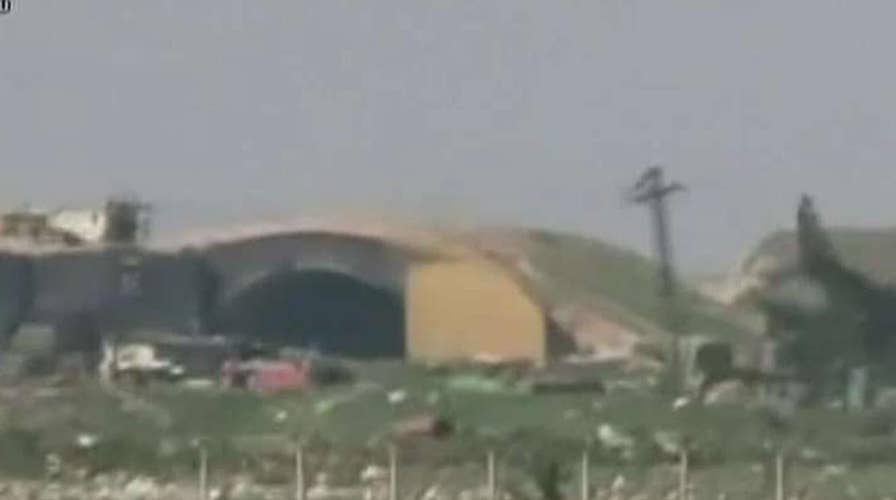New video of US missiles striking Syrian airbase, aftermath
Extensive damage from targeted strike
Iran "won't be quiet" after the U.S. missile attack that hit a number of military targets in central Syria, Iran's parliament news agency, ICANA.ir, reported Friday.
Alaeddin Boroujerdi, head of parliamentary committee on national security and foreign policy, declared "Russia and Iran won't be quiet against such acts which violate interests of the region," according to the report.
Boroujerdi warned serious consequences would follow the U.S. action.
SYRIA CALLS MISSILE ATTACK 'RECKLESS IRRESPONSIBLE BEHAVIOR'
Iranian Foreign Minister Mohammad Javad Zarif took to Twitter on Friday to denounce the strikes, saying: "Not even two decades after 9/11, U.S. military fighting on same side as al-Qaida & ISIS in Yemen & Syria. Time to stop hype and cover-ups."
Zarif also called the allegation that the Syrian military used chemical weapons as “bogus.”
ABOUT 20 SYRIAN JETS DESTROYED IN AIRSTRIKE, DEFENSE OFFICIALS SAY
"US aids Saddam's use of CW against Iran in 80's; then resorts to military force over bogus CW allegations: 1st in 2003 and now in Syria,” Zarif tweeted.
The U.S. strike came in fiery retaliation for this week's gruesome chemical weapons attack against civilians.
About 60 U.S. Tomahawk missiles hit the Shayrat air base, southeast of Homs, a small installation with two runways, where aircraft often take off to bomb targets in northern and central Syria. The U.S. missiles hit at 3:45 a.m. Friday morning and targeted the base's airstrips, hangars, control tower, and ammunition areas, U.S. officials said.
Iran Foreign Ministry spokesman Bahram Ghasemi said Friday the U.S missile strike was “dangerous, destructive and violates the principles of international law,” the semi-official ISNA news agency reported.
Ghasemi described Iran as "the biggest victim of chemical weapons in recent history," referencing Iraqi use of the weapons during its 1980s war with the Islamic Republic. He said Iran condemned the missile launch "regardless of the perpetrators and the victims" of Tuesday's chemical weapons attack in Syria.
He also warned it would "strengthen terrorists" and further add to "the complexity of the situation in Syria and the region."
Iran is one of the biggest supporters of embattled Syrian President Bashar al-Assad. Its hardline paramilitary Revolutionary Guard is deeply involved in the war. America's Sunni Arab allies in the Gulf view Syria as a proxy conflict between it and Shiite power Iran.
The Associated Press contributed to this report.








































